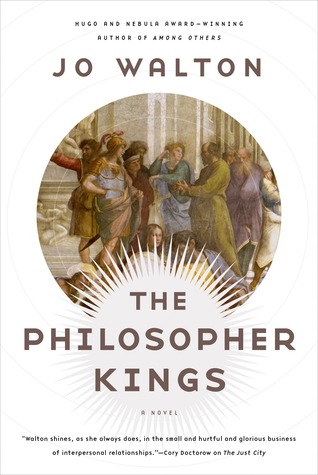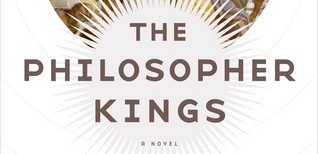 The Philosopher Kings by Jo Walton
The Philosopher Kings by Jo Walton Series: Thessaly #2
Also by this author: The Just City, Necessity
Published by Tor Books on June 30th 2015
Pages: 352
Also in this series: The Just City, Necessity




From acclaimed, award-winning author Jo Walton: Philosopher Kings, a tale of gods and humans, and the surprising things they have to learn from one another. Twenty years have elapsed since the events of The Just City. The City, founded by the time-traveling goddess Pallas Athene, organized on the principles espoused in Plato’s Republic and populated by people from all eras of human history, has now split into five cities, and low-level armed conflict between them is not unheard-of. The god Apollo, living (by his own choice) a human life as "Pythias" in the City, his true identity known only to a few, is now married and the father of several children. But a tragic loss causes him to become consumed with the desire for revenge. Being Apollo, he goes handling it in a seemingly rational and systematic way, but it’s evident, particularly to his precocious daughter Arete, that he is unhinged with grief.Along with Arete and several of his sons, plus a boatload of other volunteers--including the now fantastically aged Marsilio Ficino, the great humanist of Renaissance Florence--Pythias/Apollo goes sailing into the mysterious Eastern Mediterranean of pre-antiquity to see what they can find—possibly the man who may have caused his great grief, possibly communities of the earliest people to call themselves "Greek." What Apollo, his daughter, and the rest of the expedition will discover…will change everything.
The Just City blew me away when I read it earlier this year (here’s my review incase you missed it), so I felt like the The Philosopher Kings, which was firmly on my must read list, had much to live up to. The Pilosopher Kings starts in a dramatic way. Since the last book, 20 years have passed and the people have divided and formed multiple cities, each pursuing its own version or idea of excellence. Some with stricter interpretations of Plato, some with more lenient. But, the division leaves the new cities without the art they are so used to. Humans being humans, they find something to fight about, in this case, possession of art. The Remnant City (the original Just City) suffers attacks from “art raids” as some of the new cities try to take art they feel entitled to.
One of these art raids at the beginning of the book ends in tragedy, triggering the rest of the story. This is a very philosophical book (as one might expect). The book examines forgiveness versus vengeance, slavery, posterity, grief. It is a story that really highlights how you react is just as important as events that have happened. We see Pytheas continue to struggle with learning how to be human. And actually really coming to terms with the difference between mortal life, and his own immortality. He experiences things in ways he never could have in his immortal form and he feels the real limits that he currently has by giving up his powers. In The Just City, Pytheas was never challenged to be remain mortal without his powers as he is in this book. We know from the first book that there are many human qualities that he struggles with, and we see him face hardships in this book that almost seem to be too much. It’s overwhelming and he really struggles.
We are introduced to a new character in this book, the daughter of Simmea and Pytheas. The only daughter in a family full of boys, I can’t help but love her. She is very bright and philosophical and just about to become an adult. We see her mature and experience many life altering events. Her and her brothers are also faced with the option of trying to pursue becoming gods. As the children of Apollo, there is that possibility and we see the advantages and disadvantages of a mortal versus immortal life.
I have to admit, I found the first half of this book a bit slower in pace. I felt like there was a good bit of revisiting events from The Just City, maybe a tiny bit more than I would have liked. Perhaps if I had read the books further apart I would not have had that reaction. Don’t get me wrong, there are some major events, and I really enjoyed reading it, but when I got to about the 60% mark, I absolutely could not put this one down. Seriously, I really, really could not put this book down. Any slowness I felt in the beginning was made up for by the gripping second half.
If you are in the mood for a book full of wisdom and philosophy, or a book about Apollo and his demigod children you really need to check out this book/series.


I have this book on my TBR, the combination between fantasy and philosophy sounds wonderful! I’m glad to hear you enjoyed it
Celine recently posted…The Sunday Post #32
It is really a wonderful blend, it’s thought provoking but also quite a page turner.
Lisa (@TenaciousReader) recently posted…Review: The Philosopher Kings by Jo Walton
I’m still unsure if this series will work for me, though I’ve certainly heard some great things. Thanks for the spoiler-free review 😉
Mogsy @ BiblioSanctum recently posted…Nightlife Gets Bigger and Even More Frightening – An Interview with Author Matthew Quinn Martin
I do my best! I was honestly not sure about The Just City until I read it. I really didn’t expect to love it like
I do.
Lisa (@TenaciousReader) recently posted…Review: The Philosopher Kings by Jo Walton
That’s it, I have GOT to read The Just City as soon as humanly possible! You make this series sound so good – and very thought provoking, too. Jo Walton often writes books that shouldn’t work but do, if that makes any sense!
Danya @ Fine Print recently posted…Review: Jinn and Juice by Nicole Peeler
[…] and Bone by Rachel Caine The Just City/The Philosopher Kings by Jo Walton Grace of Kings by Ken […]